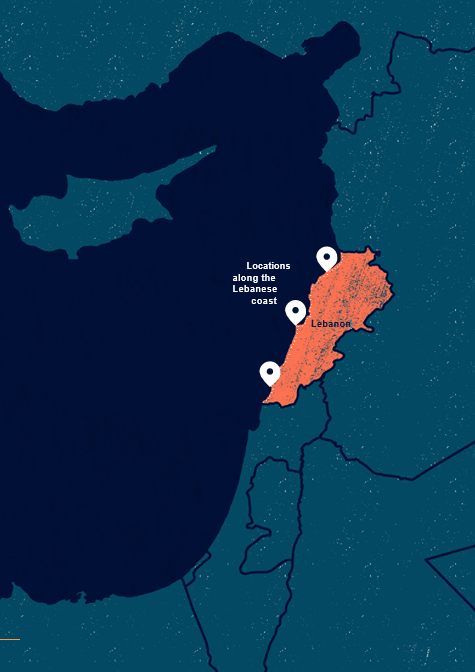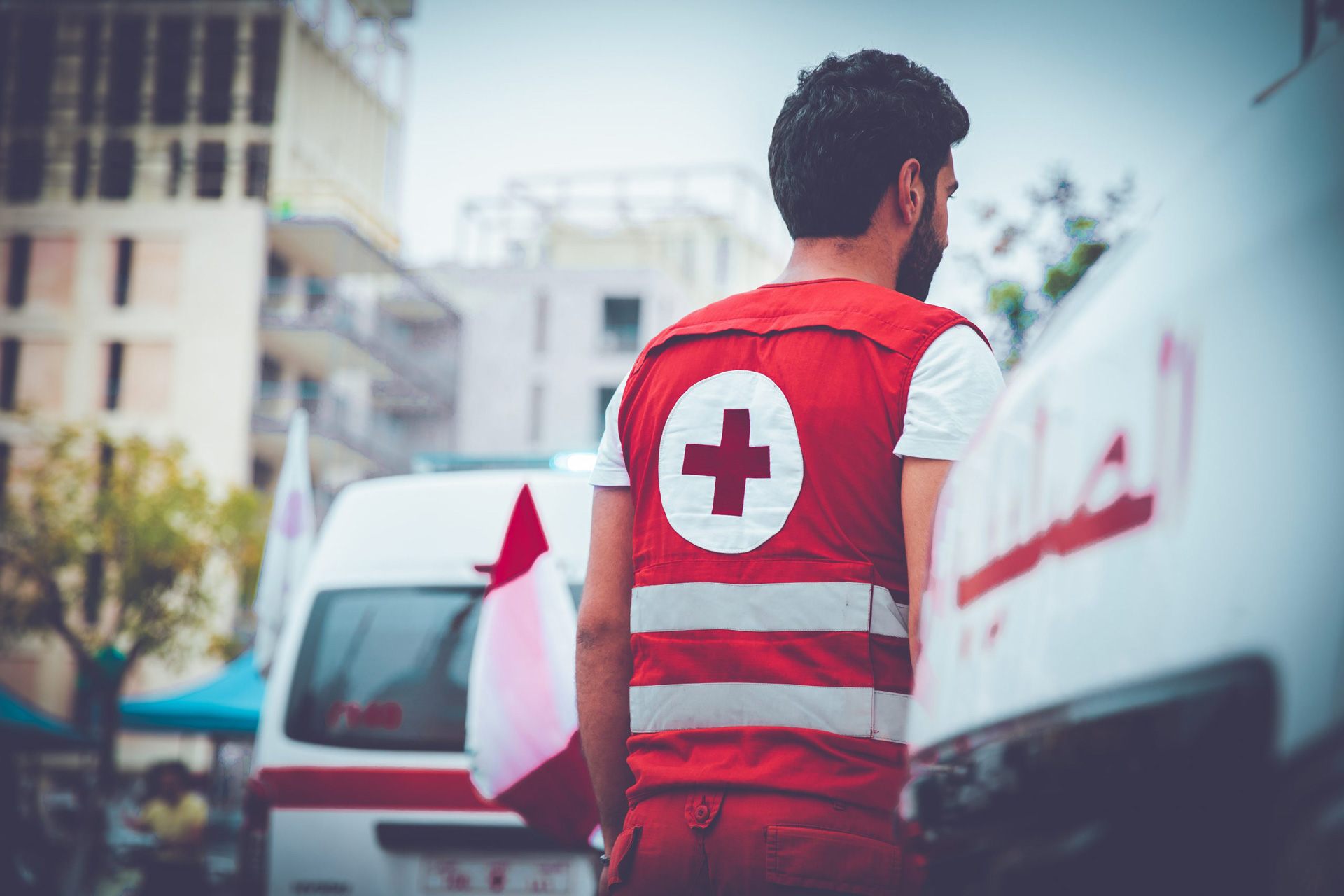HSP Case Study: Lebanese Red Cross
Lebanese Red Cross
Mobile Humanitarian Service Point
Multiple locations along the Lebanese coast
2021
- People landing by sea
- Deceased and missing migrants and displaced persons
- Temporary shelter
- Healthcare (including emergency medical services, mental health and psychosocial support)
- Food and water
- Water, sanitation and hygiene (WASH)
- Hygiene and menstrual kits
- Transport back home
- Restoring family links
- Safe referrals
Lebanon hosts one of the highest numbers of refugees from Syria as well as a considerable number of refugees from Palestine. Lebanon also hosts migrants and other displaced persons, mostly primarily but not exclusively from Bangladesh, Egypt, Ethiopia, the Philippines, Sri Lanka and Sudan. Since 2019 the country has faced an evolving complex humanitarian crisis, generating widespread and growing needs for assistance and protection. Lebanese people, and migrants and displaced persons have been significantly affected by severe inflation and unemployment, creating challenges meeting basic needs. Many migrants and displaced persons do not have access to essential services such as drinking water, food, shelter, healthcare, and mental health and psychosocial support.
Deteriorating living conditions in Lebanon are pushing Lebanese citizens, migrants and displaced persons to leave the country, leading to increased irregular boat departures. In some cases, boats leaving Lebanon have been returned by authorities in destination countries. In other cases, boat crossings have resulted in tragic drownings. For example, in September 2022, over 140 migrants and displaced persons drowned or went missing off the coast of Tartus in Syria. Many people reach Lebanese shores in dire need of medical and psychosocial support, as well as water, food, shelter and sanitation. They also have other needs, including means to contact their loved ones, or transportation back home.
The Lebanese Red Cross has long been one of the key actors recognized by Lebanese authorities in response to emergencies, including through a role formally outlined in the Lebanese government’s National Crisis Response Plan. In 2020, the Lebanese government invited the national security services, UN agencies and the Lebanese Red Cross to a roundtable to discuss their respective capacity to respond to the evolving crisis on Lebanon’s shores. The Lebanese Red Cross offered to provide assistance and protection services to survivors on land, given its limited capacity to work at sea. In 2021 the National Society initiated these interventions, enlisting staff and volunteers already trained in responding to a range of humanitarian crises. These interventions are carried out in close cooperation with Lebanese authorities.
The Lebanese Red Cross identified the need to develop new standard operating procedures for interventions with people landing via sea, since these presented a new type of emergency. The National Society used its first response to carry out a needs assessment, which, coupled with an evaluation of the services provided, formed the basis of the new procedures.
At first, these responses were simply referred to by the Lebanese Red Cross as “interventions”. But they have since been labelled “HSPs”, drawing on wider practice across National Red Cross and Red Crescent Societies. First and foremost, these mobile HSP response units are activated when need arises. They usually run for 48 hours (but can last longer if necessary). As of March 2023, the mobile HSPs have been deployed on eight occasions. This includes responses in Beirut, Tripoli and at the Syrian border, following the drowning off Tartus. The Lebanese Red Cross now provides the mobile HSP as a regular service, to be deployed as often as necessary.
The HSP is located where people disembark and, depending on where this is, may be operated from a tent or building. It provides services including first aid, medical care and ambulance transport to hospital if necessary; mental health and psychosocial support; food, water, hygiene and menstrual kits; showers and lavatories; shelter (mattresses and blankets inside a tent for the first 36–48 hours) and referral to long-term shelters; restoring family links services (free calls to family, access to Wi-Fi and phone chargers as well as registration of missing migrants’ cases); and transport for survivors who wish to return to their homes in Lebanon. The Lebanese Red Cross also organizes the repatriation of the bodies of people who lost their lives while attempting the dangerous crossing to Europe.
"All our teams are already trained in their specialist areas. We never stop our training. It’s ongoing.”
Staff member, Lebanese Red Cross
The mobile HSP is mostly staffed by volunteers, each of whom has a particular role and area of expertise, linked to the three Lebanese Red Cross sectors represented in the HSP: disaster management, emergency medical ser- vices and medico-social care. In the disaster management sector, volunteers also specialize in areas such as shelter, WASH or relief distribution.
On some occasions the Lebanese Red Cross has worked with neighboring National Red Cross and Red Crescent Societies to provide assistance and protection. For example, in response to the drowning off Tartus in September 2022, the Lebanese Red Cross collaborated with the Syrian Red Crescent to repatriate injured survivors and the bodies of shipwreck victims. The Lebanese Red Cross also collaborates with the Syrian Red Crescent and the Cyprus Red Cross on restoring family links and missing migrants.
Lebanese Red Cross staff shared their view that the most important added value of the Red Cross in this context is the level of trust it enjoys among migrants and displaced persons and the wider population. One staff member related how “everyone in Lebanon knows and trusts the Red Cross”. According to staff involved in the mobile HSP, survivors are relieved to see the Red Cross emblem, knowing that the Lebanese Red Cross is there to help them.
Lebanese Red Cross staff also felt that the combination of services and activities provided makes the mobile HSP unique in the Lebanese context. This includes efforts by the National Society to locate missing migrants and displaced persons, which continue long after the mobile HSP finishes operating. Other longer-term assistance includes support to access healthcare, which is considered particularly crucial. When survivors receive medical assistance at the mobile HSP, they are automatically registered into the Lebanese Red Cross’ medical system, making them eligible for free long-term Red Cross healthcare (including access to free medication and treatment of chronic diseases).
“Migrants are relieved when they see the Red Cross. They know that they’re safe and in good hands.”
Staff member, Lebanese Red Cross
Lebanese Red Cross staff also felt that the combination of services and activities provided makes the mobile HSP unique in the Lebanese context. This includes efforts by the National Society to locate missing migrants and displaced persons, which continue long after the mobile HSP finishes operating. Other longer-term assistance includes support to access healthcare, which is considered particularly crucial. When survivors receive medical assistance at the mobile HSP, they are automatically registered into the Lebanese Red Cross’ medical system, making them eligible for free long-term Red Cross healthcare (including access to free medication and treatment of chronic diseases).
Lebanese Red Cross insights
“We learn about the new routes that they’re taking”
Lebanese Red Cross staff member
The Lebanese Red Cross is noticing new profiles of migrants and displaced persons embarking on boats in Lebanon and attempting to reach European shores. This includes an increasing number of African migrants and displaced persons transiting through Lebanon in the hope of finding an easier journey towards Europe than routes via Libya. Some African people have only been in Lebanon for a few days when they embark. Sometimes they leave in boats towards Syria before sailing on to Cyprus. In other cases, they head south or leave from Lebanon and end up in distress off the coast of Malta several weeks later. The Lebanese Red Cross is in the process of mapping these new migration routes to better understand them and adapt its response to evolving needs.


